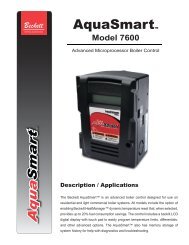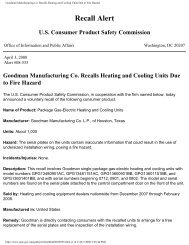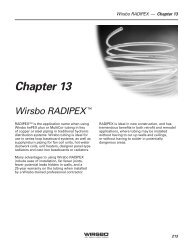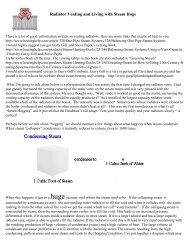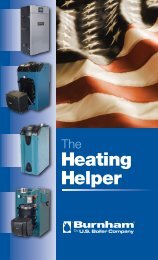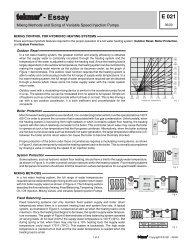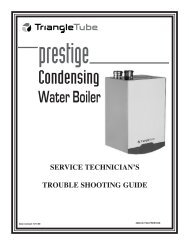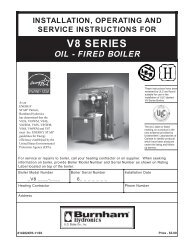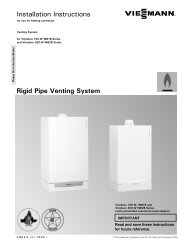Steam Locomotive Firebox Explosion on the Gettysburg Railroad ...
Steam Locomotive Firebox Explosion on the Gettysburg Railroad ...
Steam Locomotive Firebox Explosion on the Gettysburg Railroad ...
You also want an ePaper? Increase the reach of your titles
YUMPU automatically turns print PDFs into web optimized ePapers that Google loves.
evidence of a regular program in<br />
place. And by a regular program, I<br />
mean a written procedure for doing an<br />
analysis of <strong>the</strong> boiler water every day,<br />
recording, testing <strong>the</strong> water every day<br />
for <strong>the</strong> presence of oxygen, pH, how<br />
much hardness is in <strong>the</strong> water, <strong>the</strong><br />
c<strong>on</strong>ductivity of <strong>the</strong> water, how much<br />
stuff is in <strong>the</strong>re. Typically, what<br />
people do is <strong>the</strong>y test for <strong>the</strong>se things<br />
every day, <strong>the</strong>y record it <strong>on</strong> a chart and<br />
<strong>the</strong>n make a determinati<strong>on</strong> of <strong>the</strong><br />
chemicals based <strong>on</strong> what’s in <strong>the</strong><br />
boiler that day to correct whatever<br />
deficiency <strong>the</strong>re is in <strong>the</strong> water. And<br />
we found no evidence of that<br />
whatsoever.<br />
The owner of <strong>Gettysburg</strong> <strong>Railroad</strong> said:<br />
I noticed that [<strong>the</strong> accident engineer]<br />
had put a water softener in several<br />
years ago to soften <strong>the</strong> water due to<br />
[<strong>the</strong> fact] that <strong>Gettysburg</strong> has very,<br />
very hard water to work with. I will go<br />
a little fur<strong>the</strong>r. When we first come to<br />
<strong>Gettysburg</strong>, we were foolish enough to<br />
leave water sit in that engine about 2<br />
m<strong>on</strong>ths. It cost us to have <strong>the</strong> boiler<br />
acid cleaned. So, he put <strong>the</strong> water<br />
softener in.<br />
According to testim<strong>on</strong>y, <strong>the</strong> accident<br />
engineer sent boiler and/or supply water<br />
samples to <strong>the</strong> Water Chemical Services<br />
(Water Chem) of Aberdeen, Maryland 32 for<br />
testing. However, Water Chem has no<br />
record of dealing with <strong>Gettysburg</strong> Passenger<br />
Services except for filling an order for 100<br />
pounds of sodium tri-phosphate, a<br />
suspensi<strong>on</strong> agent that was delivered May 19,<br />
1995, less than a m<strong>on</strong>th before <strong>the</strong> accident.<br />
54 6JKU"EQORCP["YCU"OKUKFGPVKHKGF"CU"K9CVGT"%JGOK/<br />
ECN"%QORCP[L"FWTKPI"VGUVKOQP[0<br />
The engineer told Safety Board investigators<br />
in a postaccident interview that he<br />
performed his own water testing with a kit,<br />
much like that used for swimming pools. He<br />
stated that he kept a journal of <strong>the</strong> water<br />
testing that he performed. No test results<br />
were found or provided.<br />
Boiler Washing--The interior of a boiler is<br />
washed to minimize scale buildup in order<br />
to ensure that <strong>the</strong> boiler and its devices<br />
operate safely and efficiently. According to<br />
FRA regulati<strong>on</strong>s (49 CFR Part 230.45,<br />
“Time of Washing”):<br />
All boilers shall be thoroughly washed<br />
as often as <strong>the</strong> water c<strong>on</strong>diti<strong>on</strong>s<br />
require, but not less frequently than<br />
<strong>on</strong>ce each m<strong>on</strong>th. All boilers shall be<br />
c<strong>on</strong>sidered as having been in<br />
c<strong>on</strong>tinuous service between washouts<br />
unless <strong>the</strong> dates of <strong>the</strong> days that <strong>the</strong><br />
boiler was out of service are properly<br />
certified <strong>on</strong> washout reports and <strong>the</strong><br />
report of inspecti<strong>on</strong>.<br />
<str<strong>on</strong>g>Locomotive</str<strong>on</strong>g> 1278 had 29 washout plugs,<br />
and <strong>the</strong> FRA regulati<strong>on</strong>s (49 CFR 230)<br />
require that all washout plugs be removed<br />
when a boiler is washed. The regulati<strong>on</strong>s<br />
also require that special attenti<strong>on</strong> be given to<br />
removing scale <strong>on</strong> arch and water bar tubes<br />
and that a record be kept of all washing (49<br />
CFR 230.46 and .230. 48, respectively).<br />
Since a boiler wash and inspecti<strong>on</strong> are both<br />
required m<strong>on</strong>thly, <strong>the</strong>y are usually recorded<br />
and filed toge<strong>the</strong>r <strong>on</strong> a form No. 1.<br />
The FRA regulati<strong>on</strong>s do not specify what<br />
c<strong>on</strong>stitutes a proper washing. The railroad<br />
industry has l<strong>on</strong>g had detailed methods and<br />
special equipment for boiler washing. In<br />
1915, <strong>the</strong> American <strong>Railroad</strong> Administrati<strong>on</strong><br />
(ARA) adopted a recommended practice for<br />
boiler washing that included a number of<br />
recommended designs for boiler wash<br />
31



